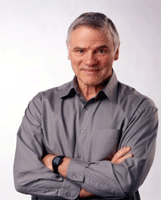Dr. Leroy Hood

Dr. Leroy Hood is recognized as one of the world's leading scientists in the molecular biotechnology and genomics field. He will present “Systems Biology: Predictive and Preventive Medicine” in Masur Auditorium, Building 10, on Dec. 15, 2004 at 3 p.m. He holds numerous patents and awards for his scientific breakthroughs and is particularly proud of his lifelong commitment to making science accessible and understandable to the general public, especially children.
After earning an M.D. from Johns Hopkins University in 1964 and a Ph.D. in biochemistry from the California Institute of Technology (CalTech) in 1968, Dr. Hood focused his research on the study of molecular immunology and biotechnology. His interests include autoimmune diseases, cancer biology, and mammalian development. His professional career began at CalTech, where Dr. Hood and his colleagues pioneered the DNA and protein synthesizers and sequencers that constitute the technological foundation for contemporary molecular biology. One of the instruments revolutionized genomics by allowing the rapid automated sequencing of DNA.
In 1992, Dr. Hood moved to the University of Washington to create the cross-disciplinary Department of Molecular Biotechnology. Here, he applied his laboratory's expertise in DNA sequencing to the analysis of human and mouse immune receptors and initiated studies in prostate cancer, autoimmunity, and hematopoietic stem cell development.
In 2000, Dr. Hood founded the Institute for Systems Biology in Seattle to pioneer systems approaches to biology and medicine. He has published more than 600 peer-reviewed papers and coauthored textbooks on biochemistry, immunology, molecular biology, and genetics. He also coedited Code of Codes , a book discussing scientific, social, and ethical issues raised by genetic research.
Numerous organizations have honored Dr. Hood with academic and scientific awards, including the Lasker Award in 1987 for studies on the mechanism of immune diversity, the Kyoto Prize for Advanced Technology in 2002, and the Lemelson-MIT Prize for Invention and Innovation in 2003. He is a member of the National Academy of Sciences, the American Philosophical Society, and the American Association of Arts and Sciences.
Page last updated Sep 26, 2008
